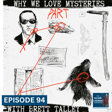
92. Nightstalker: The Golden State Serial Killer Joe DeAngelo with Julia Cowley
A ransacker stalked a small city in California, breaking into 120 homes in 20 months. Two hundred and twenty miles away, three years later, a man committed 50 home-invasion rapes. Three years after that and 300 miles to the south, a series of at least 11 murders occurred. Former FBI Profiler Julia Cowley, the host of The Consult podcast and lead profiler on the case, joins us to discuss the man who would be linked to the seemingly dissimilar crimes, Joe DeAngelo, who turned out to be the Visalia Ransacker, the East Area Rapist, the Original Nightstalker and a one-man machine of terror now known as the Gold State Killer. Julie talks about how law enforcement was able to connect each of those sets of crimes and identify the former mechanic and police officer, DeAngelo, who is now serving 12 life sentences.
Join our community on Facebook, The Silver Linings Fireside Chat:
https://www.facebook.com/groups/1361159947820623/
To support the podcast and get early and ad-free episodes and exclusive content, join our Patreon:
https://www.patreon.com/TheSilverLiningsHandbook
To check out The Consult podcast on Patreon:
https://patreon.com/theconsultpod
To check out The Consult podcast episodes on Joe DeAngelo:
Profiling Joe DeAngelo, Part 1:
https://www.truecrimeconsult.com/profiling-joe-deangelo-part-1/
Profiling Joe DeAngelo, Part 2:
https://www.truecrimeconsult.com/profiling-joe-deangelo-part-2/
Profiling Joe DeAngelo, Part 3:
https://www.truecrimeconsult.com/profiling-joe-deangelo-part-3/



















